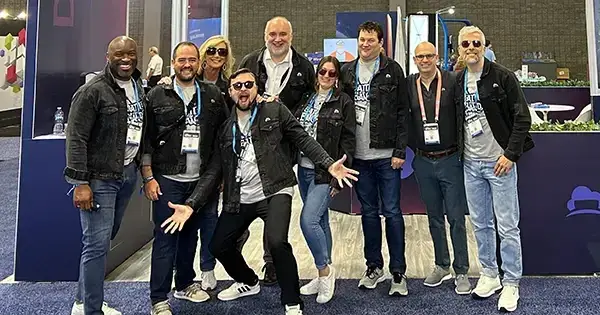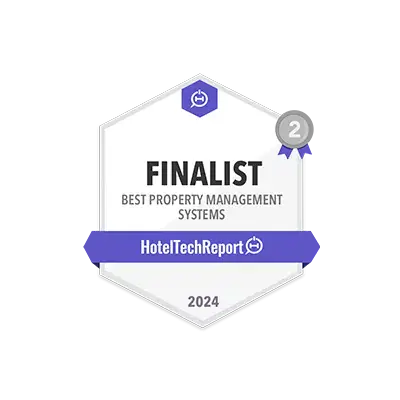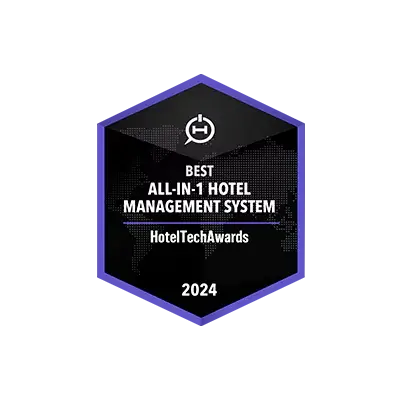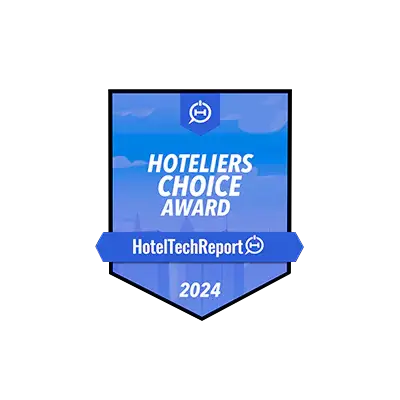80+ hospitality statistics
and trends
The travel industry has always been resilient, responding to new technology, changing political climates, and life-altering current events. No matter what, the industry adjusts and comes out stronger than ever.
But what can we expect this year and in the future?
There’s no better way to understand the current state of the hospitality sector than from trusted data sources like STR, the Bureau of Labor Statistics, Statista, and more. Here we’ve compiled a roundup of key hospitality industry statistics to help you understand the current state of the industry, travel trends, unemployment rates, and more.
Global hospitality industry statistics
The tourism industry experienced remarkable recovery and reached pre-pandemic levels across hotel occupancy rates, daily rates, profitability, and RevPAR. Looking ahead, we can expect rapid growth rates to decline, with global travelers returning to more normal booking behavior.
- Travel and tourism accounted for 7.6% of the global gross domestic product (GDP) in 2022. (Source)
- Over 2 billion people are expected to travel yearly by 2026. (Source)
- Looking at a longer-term forecast, between 2022 and 2032, Travel & Tourism’s contribution to the global economy is expected to grow at an average annual rate of 5.8% which is more than double the 2.7% average annual growth rate estimated for the global economy. (Source)
- International tourism reached almost 90% of pre-pandemic levels in 2023, setting the stage for a full recovery in 2024. (Source)
- In 2024, hotel rates are forecasted to rise in most locations around the world and by as much as 17.5% in some cities. (Source)
- According to Statista, 69% of total revenue from the international travel and tourism market is booked online, representing approximately USD 475 billion in revenue in 2022 and forecasted to surpass USD 521 billion in 2023. (Source)
- In the next three to five years, China is set to become the world’s biggest outbound travel and tourism market. (Source)
- As of late December 2022, unaffiliated hotels representing approximately 30,000 rooms were in construction — a growth of about 2 percent compared to 2021. (Source)
- Marriott International is the world’s biggest hotel provider, with a revenue of USD 23.7 billion. (Source)
- Hotel brands and hotel chains had 131,000 rooms under construction in December 2022. (Source)
- There are roughly 60,000 U.S. hotels, ⅓ of which are independent. (Source)
- There are over 1.5 million luxury hotel rooms available globally, and the figure is set to increase by 12% by 2033. (Source)

Booking behavior
From the blending of business and leisure travel to a growing emphasis on sustainability, the hotel market has changed significantly over the past few years.
- According to Expedia, travel is more important than it was pre-pandemic for 46% of travelers and even more so for Millennials (52%) and Gen Zs (50%). (Source)
- 92% of travelers expect to travel at least as much in 2024 as they did in the prior year, while 40% of respondents plan to travel more. (Source)
- Almost three-quarters of bookings at independent hotels were for stays of one to four nights, with 43% of booked room nights being one or two-night stays and 30% being three or four nights. (Source)
- The most popular types of leisure travel in 2024 include visiting family and friends (46%), beach vacations (36%) and road trips (34%). (Source)
- Expedia’s Value Index 2023 survey found that 76% of business travelers planned to extend a work trip for leisure in 2023, and 28% plan to take a flexcation.(Source)
- In the next three to five years, China is set to become the world’s biggest outbound travel and tourism market. (Source)
- In 2024, 46% of global workers plan to travel for business or bleisure, with Indian (65%), UAE (64%), and Chinese (60%) workers being the most likely to travel this way. (Source)
Experiential travel
- 61% of consumers will spend more for personalized experiences. (Source)
- 32% of travelers are planning to visit a bucket-list destination post-pandemic. (Source)
- 34% of U.S. travelers plan to attend a gig, music concert, or festival in 2024, including 50% of 25-to-34-year-olds. (Source)
- Hotels.com data shows that more than 90% of travelers considered the “vibe” of a hotel as an important factor when booking. (Source)
- Travelers want unique vacations that shock, surprise, and delight, with 50% seeking complete culture shock and 73% seeking out-of-comfort zone travel that pushes them to the limits. (Source)
- During the first 53 concert nights of Taylor Swift’s 2023 Eras Tour, U.S. hotels pulled in an estimated $208 million in revenue. (Source)
- More than half of travelers say they’ve researched or booked a trip to a destination after seeing it on a TV show or in a movie. (Source)
- 52% of travelers are keen to book a surprise trip where everything down to the destination is unknown until arrival. (Source)

Factors influencing decision-making
- Globally, 81% of travelers plan to travel the same or more in 2024 compared to 2023. (Source)
- A survey from Expedia found that 35% of travelers are more concerned about value than ever before, and 43% planned to stay in one to three-star hotels in 2023. (Source)
- Over half of travelers (54%) would be willing to pay for accommodation upgrades, and 47% are willing to invest in flight or train upgrades. (Source)
- 64% of travelers aim to cut other areas of their personal spending to prioritize leisure travel. (Source)
- According to Expedia, the most appealing deals to travelers are complimentary add-ons and discounts for hotel bookings in advance, last-minute, a package, or a longer stay. (Source)
- To 83% of consumers, positive reviews on third-party booking websites and social media are an important factor when choosing one hotel over another. (Source)
- A Cornell study found that 93% of consumers switch between different online travel agencies (OTAs) before making a final decision. (Source)
- According to Forbes, 46% of travelers are somewhat or very likely to adjust their travel plans in one way or another due to inflation. (Source)
- In a survey from Atmosphere Research, four in 10 travelers said that a “Buy Now, Pay Later” (BNPL) option had made it possible for them to take a trip. (Source)
- Nearly three-quarters of Millennials (72%) and Gen Z (74%) have credit cards with travel rewards and benefits. (Source)
- Three in five travelers book consistently with one brand or one credit card to maximize their benefits. (Source)
- For 80% of global travelers, being able to utilize personal devices seamlessly with on-property technology, from Wi-Fi to streaming apps, is important. (Source)
Sustainability
- 90% of consumers now look for sustainable options when traveling, and half are willing to pay more for transportation, activities, and lodging if the option is more sustainable. (Source)
- 75% of global travelers say that they want to travel more sustainably over the next 12 months. (Source)
- 59% of travelers reported they would spend more to improve the sustainability of their trips. (Source)
- 74% of business travelers agree that it’s important to minimize their environmental footprint. (Source)
- 7 out of 10 travelers have avoided a travel destination or transportation option because of skepticism about commitment to sustainable practices was realSource)
- 43% of travelers now plan their sightseeing so that they can walk, cycle or take public transport. (Source)
- On average, consumers are willing to pay 38% more to make their travels more sustainable. (Source)
- 65% of consumers would feel better about staying in a particular property if they knew it had a sustainable certification or label. (Source)
- 75% of travelers seek authentic local tours and cultural activities that give back to the community they visit. (Source)
- Nearly 70% of consumers are willing to sacrifice convenience if it means being a more sustainable traveler. (Source)
Booking source
How are traveler booking patterns changing? Are online travel agencies (OTAs) still the leading source of online bookings, or are travelers starting to book direct?
- In 2023, OTAs generated 60% of global bookings, much higher than the 40% of bookings generated on direct channels. (Source)
- 75% of consumers who booked directly with a hotel online visited an OTA before purchasing. (Source)
- In the 60 days before purchasing a hotel reservation, travelers make 25 visits to travel-related sites. (Source)
- 66% of all bookings were conducted online in 2023, and mobile accounts for 35% of all online sales. (Source)
- Data from Booking.com shows that almost half of room nights (48%) were booked on its mobile app in the second quarter of 2023. (Source)
- Booking.com was the most downloaded OTA app in the world in 2022, with 80 million downloads. In second place was Airbnb, with 52 million downloads, followed by Expedia, with 27 million downloads. (Source)

Hospitality technology statistics
The hotel industry is experiencing rapid digitalization across various areas, including guest experience, marketing, revenue management, and more.
- Globally, 91% of hotels use a PMS, 64% have a booking engine, and 33% have a channel manager. (Source)
- According to Skift, 73% of travelers are likely to return to a property that meets their technological needs. (Source)
- 64% of hotels worldwide use booking engines. (Source)
- 73% of travelers embrace the use of mobile devices to make reservations and interact with properties. (Source)
- Free wifi remains the top technological necessity for travelers, with 91% of consumers rating it as moderately or extremely important. (Source)
- 45% of hotels worldwide use website builders and direct booking tools. (Source)
- POS software plays an essential role in the hospitality industry, and the global POS software market is predicted to reach USD 19.56 billion by 2028. (Source)
- According to Hospitality Tech’s 2023 POS industry trends report, integration is one of the key features driving POS purchases. (Source)
- Almost two-thirds (62%) of hotels say they are increasing their use of virtual reality in training. (Source)
- 100% of hoteliers say their IT budgets will either increase or hold steady in 2024. (Source)
Artificial Intelligence (AI)
- 48% of travelers now trust AI to plan their trips. (Source)
- According to a 2023 survey, 22% of users worldwide used an AI chatbot to plan or research travel. (Source)
- 87% of travelers say they would like for generative AI to provide specific recommendations they can rely on every time. (Source)
- 79% of travelers wish they could have generative AI manage tasks on their behalf. (Source)
- According to Skift, 42% of travel executives agree that AI is most useful for using data to provide more personalized offerings. (Source)
- An estimated 60% of generative AI skeptics will use and value it in 2024, whether they realize it or not. (Source)
Hospitality online marketing statistics
How are travelers finding lodging operators in today’s market? Travelers of all ages are moving to platforms like Google and TikTok for travel research and booking.
- Google dominates the global search engine market share with a 91% market share. (Source)
- In 2023, the four largest OTAs –Expedia Group, Booking Holdings, Airbnb and Trip.com Group– spent a record 16.8 billion on sales and marketing, up 20% from just more than $14 billion in 2022. (Source)
- Ross Bordem, CEO and Founder of Matador Network, a travel content creator community, predicts that short-form video will become the most crucial form of marketing in the next decade. (Source)
- Over 40% of travelers over the age of 30 prefer the social media platform TikTok over Google as a search tool. (Source)
- A December 2022 survey from Google found that 41% of respondents use YouTube video content in their travel research. (Source)
- 67% of travel enthusiasts use Instagram to find inspiration for new travel journeys. (Source)
- Google dominates the global search engine market share with a 92% market share. (Source)

Hospitality employment statistics
Employment remains a major challenge for the hospitality industry today. With labor shortages at an all-time high, hotel businesses worldwide are still looking for ways to attract and retain qualified talent.
Staffing & hiring
- The hotel industry currently employs 1.8 million workers in the United States. (Source)
- In the food services and accommodation industry, it now takes 5.5 weeks on average to fill job openings compared to two to three weeks in previous years. (Source)
- In July 2022, leisure and hospitality employees in the US made, on average, USD 20.22 per hour, up USD 18.60 from the year before.(Source)
- Women now hold one in four of all chief-level positions at hotel companies. (Source)
- According to Deloitte, 51% of hoteliers believe their biggest workforce challenge is the mismatch of needs with skills of available workers, followed closely by the cost of recruiting and onboarding (48%). (Source)
Labor shortages
- In a survey by Deloitte, 53% of hotel respondents said they are at 25-74% of their pre-pandemic workforce, and less than 10% were expected to be completely staffed by the end of 2023. (Source)
- In an October 2022 poll from the American Hotel & Lodging Association (AHLA), 87% of respondents indicated they were experiencing a staffing shortage, 36% severely so. (Source)
- In a 2023 survey, 70% of hotels reported reducing or eliminating amenities and services in response to staffing shortfalls. (Source)
- Due to the effects of the pandemic, as of October 2021, there were 300,000 fewer workers in the hotel industry than just two years prior. (Source)
- The AHLA Foundation projects job growth of 12% in the American hotel industry over the next five years, compared to 8.0% for the U.S. overall. (Source)

















